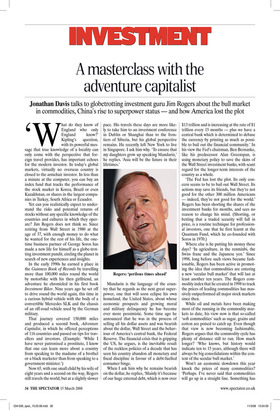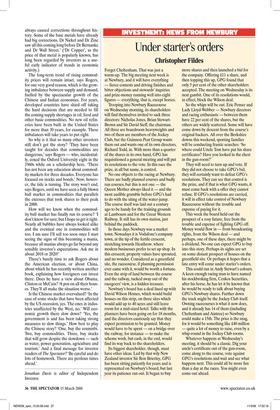INVESTmENT
A masterclass with the adventure capitalist
Jonathan Davis talks to globetrotting investment guru Jim Rogers about the bull market in commodities, China’s rise to superpower status — and how America lost the plot ‘W with its powerful mes hat do they know of England who only England know?’ Kipling’s question, sage that true knowledge of a locality can only come with the perspective that foreign travel provides, has important echoes for the modern investor. In today’s global markets, virtually no overseas country is closed to the armchair investor. In less than a minute at the computer, you can buy an index fund that tracks the performance of the stock market in Korea, Brazil or even Kazakhstan, or shares in the largest companies in Turkey, South Africa or Ecuador.
Yet can you realistically expect to understand the risks and potential returns of stocks without any specific knowledge of the countries and cultures in which they operate? Jim Rogers does not think so. Since retiring from Wall Street in 1980 at the age of 37, with enough money to do what he wanted for the rest of his life, the onetime business partner of George Soros has made a new life for himself as a globe-trotting investment pundit, circling the planet in search of new experiences and insights.
In the early 1990s he earned a place in the Guinness Book of Records by travelling more than 100,000 miles round the world by motorbike with his then girlfriend, an adventure he chronicled in his first book Investment Biker. Nine years ago he set off to drive round the world again, this time in a curious hybrid vehicle with the body of a convertible Mercedes SLK and the chassis of an off-road vehicle used by the German military.
That journey covered 150,000 miles and produced a second book, Adventure Capitalist, in which he offered perceptions of 116 countries and passed on tips for travellers and investors. (Example: ‘While I have never patronised a prostitute, I know that one can learn more about a country from speaking to the madame of a brothel or a black marketer than from speaking to a government minister.’) Now 65, with one small child by his wife of eight years and a second on the way, Rogers still travels the world, but at a slightly slower pace. His travels these days are more likely to take him to an investment conference in Dublin or Shanghai than to the frontiers of Siberia, but his global perspective remains. He recently left New York to live in Singapore. I ask him why. ‘To ensure that my daughters grow up speaking Mandarin,’ he replies. ‘Asia will be the future in their lifetimes.’ Mandarin is the language of the country that he regards as the next great superpower, one that will soon eclipse his own homeland, the United States, about whose economic prospects and growing moral and military delinquency he has become ever more pessimistic. Some time ago he announced that he was in the process of selling all his dollar assets and was bearish about the dollar, Wall Street and the behaviour of America’s central bank, the Federal Reserve. The financial crisis that is gripping the US, he argues, is the inevitable result of the reckless policies of a decade that has seen his country abandon all monetary and fiscal discipline in favour of a debt-fuelled consumer binge.
When I ask him why he remains bearish on the dollar, he replies, ‘Mainly it’s because of our huge external debt, which is now over $13 trillion and is increasing at the rate of $1 trillion every 15 months — plus we have a central bank which is determined to debase the currency by printing as much as possible to bail out the financial community.’ In his view the Fed’s chairman, Ben Bernanke, like his predecessor Alan Greenspan, is using monetary policy to save the skins of the Wall Street investment banks, with scant regard for the longer-term interests of the country as a whole.
‘The Fed has lost the plot. Its only concern seems to be to bail out Wall Street. Its actions may save its friends, but they’re not good for the other 300 million Americans — indeed, they’re not good for the world.’ Rogers has been shorting the shares of the investment banks for months, and sees no reason to change his mind. (Shorting, or betting that a traded security will fall in price, is a routine technique for professional investors, one that he first learnt at the Quantum Fund, which he co-founded with Soros in 1970.) Where else is he putting his money these days? ‘In agriculture, in the renminbi, the Swiss franc and the Japanese yen.’ Since 1998, long before such views became fashionable, Rogers has been active in promoting the idea that commodities are entering a new ‘secular bull market’ that will last at least another ten years. The Rogers commodity index that he created in 1998 to track the prices of leading commodities has massively outperformed all major stock markets since then.
While oil and metals have been making most of the running in the commodity markets to date, his view now is that so-called ‘soft commodities’ such as sugar, grains and cotton are poised to catch up. Even though that view is now becoming fashionable, Rogers argues that the commodity cycle has plenty of distance still to run. How much longer? ‘Who knows, but history would indicate ten to 15 years, although there will always be big consolidations within the context of the secular bull market.’ Won’t an economic slowdown this year knock the prices of many commodities? ‘Perhaps. I’ve never said that commodities will go up in a straight line. Something has always caused corrections throughout history. Some of the base metals have already had big corrections. Dr Nickel and Dr Zinc saw all this coming long before Dr Bernanke and Dr Wall Street.’ (‘Dr Copper’, as the price of that metal is popularly known, has long been regarded by investors as a useful early indicator of trends in economic activity.) The long-term trend of rising commodity prices will remain intact, says Rogers, for one very good reason, which is the growing imbalance between supply and demand, fuelled by the spectacular growth of the Chinese and Indian economies. For years, developed countries have shied off taking the hard decisions that are needed to fill the coming supply shortages in oil, food and other basic commodities. No new oil refineries have been built in the United States for more than 30 years, for example. These imbalances will take years to put right.
So why is it that so many other investors still don’t get the story? ‘They have been taught for decades that commodities are dangerous,’ says Rogers — who, incidentally, coxed the Oxford University eight in the 1960s while on a scholarship here. ‘There has not been any education about commodity markets for three decades. Everyone has focused on stocks and bonds.’ Now, however, the tide is turning. The story won’t end, says Rogers, until we have seen a fully blown bull market in commodities that parallels the excesses that took shares to their peak in 2000.
How will we know when the commodity bull market has finally run its course? ‘I don’t know for sure, but I hope to get it right. Nearly all bubbles have always looked alike and the eventual one in commodities will too. I am sure I’ll sell too soon once I start seeing the signs of this becoming a mania, because all manias always go far beyond any sensible investor’s expectations. Ask me in about 2018 or 2020!’ There’s barely time to ask Rogers about the American election, or about China, about which he has recently written another book, explaining how foreigners can invest there. Does he have a view about Obama, Clinton or McCain? ‘A pox on all their houses. They’ll all make the situation worse.’ Is the Chinese market overvalued? ‘In the case of some stocks that have been affected by the US recession, yes. The ones in industries unaffected by the West, no.’ Will economic growth there slow down? ‘Yes, the government is and has been taking strong measures to slow things.’ How best to play the Chinese story? ‘One, buy the renminbi. Two, buy commodities. Three, buy stocks that will grow despite the slowdown — such as water, power generation, agriculture and tourism.’ And a final message for investor readers of The Spectator? ‘Be careful and do lots of homework. There are perilous times ahead.’



























































































 Previous page
Previous page